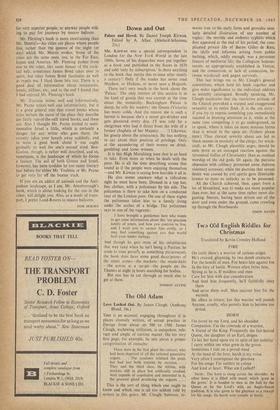Down and Out
MR. KIRWAN was a special correspondent in London for the New York World in the late 1860s. Some of his dispatcheS were put together as a book and published in the States in 1870 and sold 'only by subscription.' Is,there anything in the book that merits this re-issue after nearly a century? Only if the reader has never read Mayhew, or Dickens, or never seen a Hogarth.
There isn't very much in the book about the 'Palace.' The only interest of this section is in the kind of gossip that was current at the time about the monarchy. Buckingham Palace is damp, he tells his readers: the Queen (Victoria) has many colds. And the reason she is such a hermit is because she's a secret gin-drinker and gets plastered every day. ('I was told by a clergyman who had it direct from the wife of a former chaplain of her Majesty. . . .') Likewise, his gossip about the aristocracy. He has nothing to say about their position of privilege. Only at the squandering of their money on drink, gambling and loose women.
It is this High Moralising tone that is so hard to take. Even more so when he deals with the poor. He is all the time describing scenes that "sound as if the people were enjoying themselves —and Mr. Kirwan is saying how horrible it all is.
He also, seems unaware what a ridiculous sight he must have been. Dressed in a top hat, fine clothes, with a policeman by his side. The policeman is there to take him on a conducted tour of the London poor. On one of these nights the policeman takes him to a family living under the arches of a bridge. The policeman says to one, of the vagrants: I have brought a gentleman here who wants to get some information about this 'ere precious family of yours, and how you contrive to live, and I want you to answer him civilly. or I may find something against you that would hurt your tender feelings.
And though he gets most of his information that way (and when he isn't being a Puritan, he tends to treat poverty as something picturesque), the book does have some good descriptions of the street scenes—the markets—the music-halls —the action at a rat-pit--the people on the Thames at night in boats searching for bodies.
But one has to cut through so much else to get at them.
NORMAN LEVINE






























 Previous page
Previous page